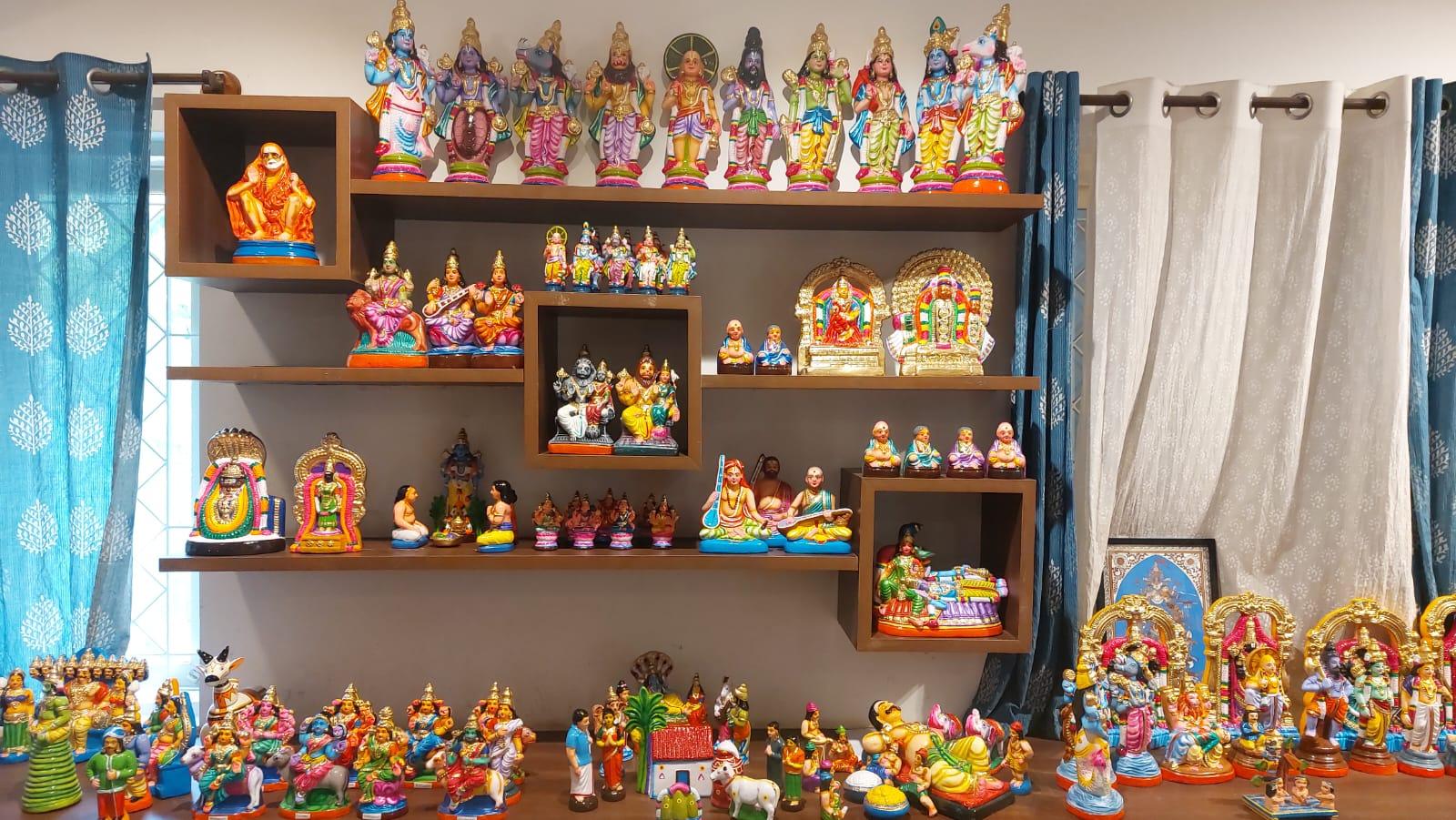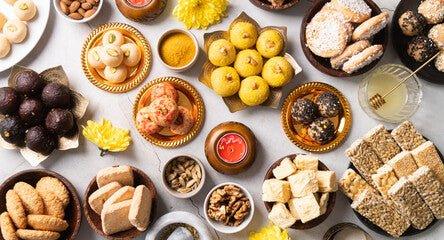My fondest memories of all festivals celebrated at home are the days we frantically spend making amazing lots of sweets and savouries and storing them in big boxes. This is not for our consumption but giving them as offerings to all neighbours and relatives who visit home. This got me thinking as to what is the history behind the different ideas of gifting in the Indian sub-continent.
In India, the concept of gifting during festivals is deeply rooted in tradition and plays a significant role in fostering relationships and celebrating special occasions. The practice of giving and receiving gifts during festivals is a way to express love, gratitude, and goodwill. Here are some key aspects of the traditional concept of gifting in India during festivals:
- Exchange of Sweets and Food: One of the most common and cherished traditions is the exchange of sweets and homemade delicacies. Families prepare special dishes and sweets like ladoos, barfis, and jalebis to share with friends and neighbours. These homemade treats are often exchanged as gifts, symbolizing the sweetness of the occasion.
- Traditional Attire : During festivals, it is customary to gift traditional clothing, such as sarees, kurta-pajamas, or dhotis. This not only adds to the festive spirit but also allows people to dress up in traditional attire when celebrating.
- Jewellery: Jewellery is considered an auspicious and valuable gift, especially during occasions like weddings and festivals. Families often gift gold or silver jewellery to mark important festivals and milestones.
- Idols and Religious Items: Many festivals in India have religious significance, and it is common to gift idols of deities, religious books, or other items related to the worship of gods and goddesses.
- Decorative Items: Festivals often involve decorating homes, and decorative items like Diyas, candles, lanterns, rangoli stencils, and wall hangings are popular gifts to help enhance the festive atmosphere.
- Charitable Giving: In a more philanthropic tradition, some families choose to donate to charities or help those in need during festivals as a way of spreading goodwill.
Gift giving Etiquette
Gift-giving etiquettes can vary significantly across different regions of India due to the diverse cultures, traditions, and customs present in the country. Here are some variations in gift-giving etiquettes observed in different parts of India:
-
North India:
- Cash Gifts: In North India, it is common to give cash gifts in envelopes (often referred to as "shagun") during weddings and festivals.

- Sweets and Dry Fruits: Sweets and dry fruits are popular gifts, particularly during festivals like Diwali.

- Traditional Attire : Gifting traditional clothing, such as sarees, suits, and turbans, is a common practice, especially during weddings and religious ceremonies.
-
South India:
- Gold and Jewelry: South India is known for its affinity for gold, and gifting gold jewelry, particularly during weddings, is a prevalent tradition.

- Fruits and Flowers: Gifting fresh fruits and flowers, often in the form of garlands, is common during religious ceremonies and festivals.
- Coconut and Betel Leaves: In some South Indian cultures, gifting items like coconuts and betel leaves is considered auspicious.
-
East India:
- Sweets: Sweets like rasgulla, sandesh, and rosogolla are commonly exchanged during festivals and celebrations.
- Handicrafts: Eastern India is known for its rich heritage of handicrafts, and handmade items like terracotta pottery and artworks make thoughtful gifts.
- Cloth Fabrics: In regions like West Bengal, gifting fine textiles like silk sarees is a cherished tradition.
-
West India:
- Traditional Garments: Gifting traditional attire like lehengas, cholis, and dhotis is common during weddings and festivals.
- Dry Fruit and Sweets: Sweets like mithai and dry fruits are popular gifts, especially during Diwali and other festive occasions.

- Decorative Items: Handcrafted decorative items, including clay lamps (diyas) and torans (door hangings), are often given as gifts during festivals.
-
Northeast India:
- Local Handicrafts: Each state in the Northeast has its unique handicrafts and traditional items, which are often given as gifts.
- Traditional Attire : Ethnic clothing from the region, such as mekhela chadors and shawls, is exchanged during special occasions.
- Local Food and Beverages: Unique regional food items and beverages are appreciated as gifts in the Northeast.
-
Western Ghats and Tribal Areas:
- Tribal Artifacts: In tribal regions, gifting traditional artifacts, jewelry, and items made by tribal communities holds cultural significance.
- Natural Products: Gifts often include natural products like honey, herbs, and spices that are locally sourced.
It's important to note that within each region, there may be further variations in gift-giving customs based on specific communities and local traditions. When participating in gift-giving events in India, it's advisable to inquire about the local customs and preferences to ensure that your gifts are well-received and culturally appropriate.
Festivals and Gifts

Gifting is a common practice in many festivals across India. Here are some of the major festivals and occasions where gift-giving is prevalent:
- Diwali: Diwali, also known as the Festival of Lights, is one of the most significant festivals in India. It is a time when families exchange gifts, sweets, and decorative items. People also give and receive gifts as a way to express good wishes and blessings during this festival.
- Eid: Eid-ul-Fitr and Eid-ul-Adha are important Islamic festivals celebrated with the exchange of gifts. It is customary for Muslims to give gifts, especially new clothes, to family and friends during Eid-ul-Fitr, which marks the end of Ramadan.
- Raksha Bandhan: Raksha Bandhan is a Hindu festival celebrating the bond between brothers and sisters. Sisters tie a rakhi (a sacred thread) on their brothers' wrists, and in return, brothers give gifts and promises of protection.

- Christmas: Christmas is celebrated by Christians across India and involves the exchange of gifts, especially among family members and friends. It is a time for spreading joy and goodwill.
- Holi: Holi, the festival of colours, is another occasion for gift-giving in India. People exchange sweets, snacks, and small gifts as part of the festive celebrations.
- Ganesh Chaturthi: During this Hindu festival dedicated to Lord Ganesha, it is common to exchange gifts, especially among friends and family members who gather to celebrate.
- Pongal/Makar Sankranti: In South India, Pongal is celebrated with the exchange of sugarcane, jaggery, and traditional dishes. In other parts of India, Makar Sankranti is celebrated with gifts of til (sesame seeds), jaggery, and various snacks.
- Durga Puja: In West Bengal and other parts of India, Durga Puja is a major festival during which people exchange gifts, especially among friends and relatives who visit each other's homes and pandals (temporary temples).
- Navratri and Dussehra: These Hindu festivals Navratri often involve giving gifts, especially to young children. It is a time for the community to come together and celebrate the victory of good over evil.
- Janmashtami: This festival celebrates the birth of Lord Krishna. Devotees exchange gifts and sweets to commemorate the occasion.
- Guru Purnima: On Guru Purnima, students express gratitude to their teachers by offering gifts as a token of respect and appreciation.




Leave a comment
All comments are moderated before being published.
This site is protected by hCaptcha and the hCaptcha Privacy Policy and Terms of Service apply.